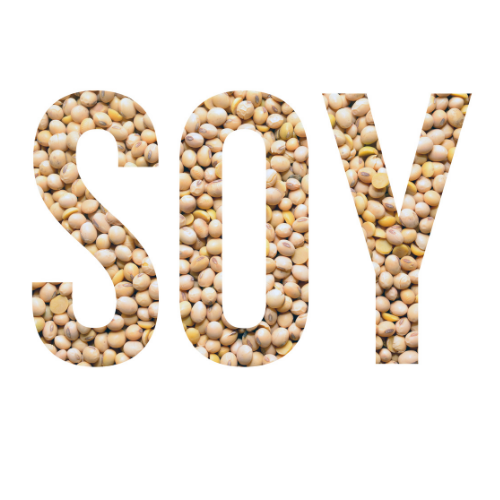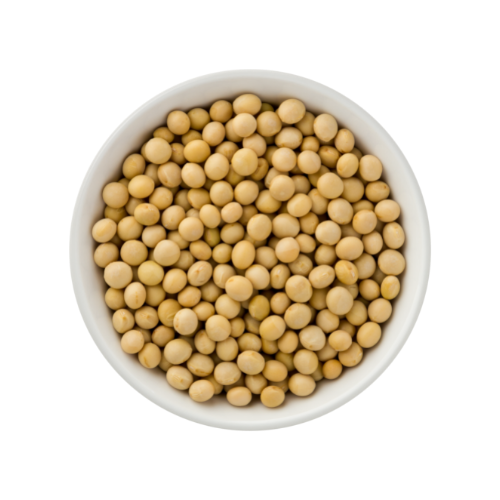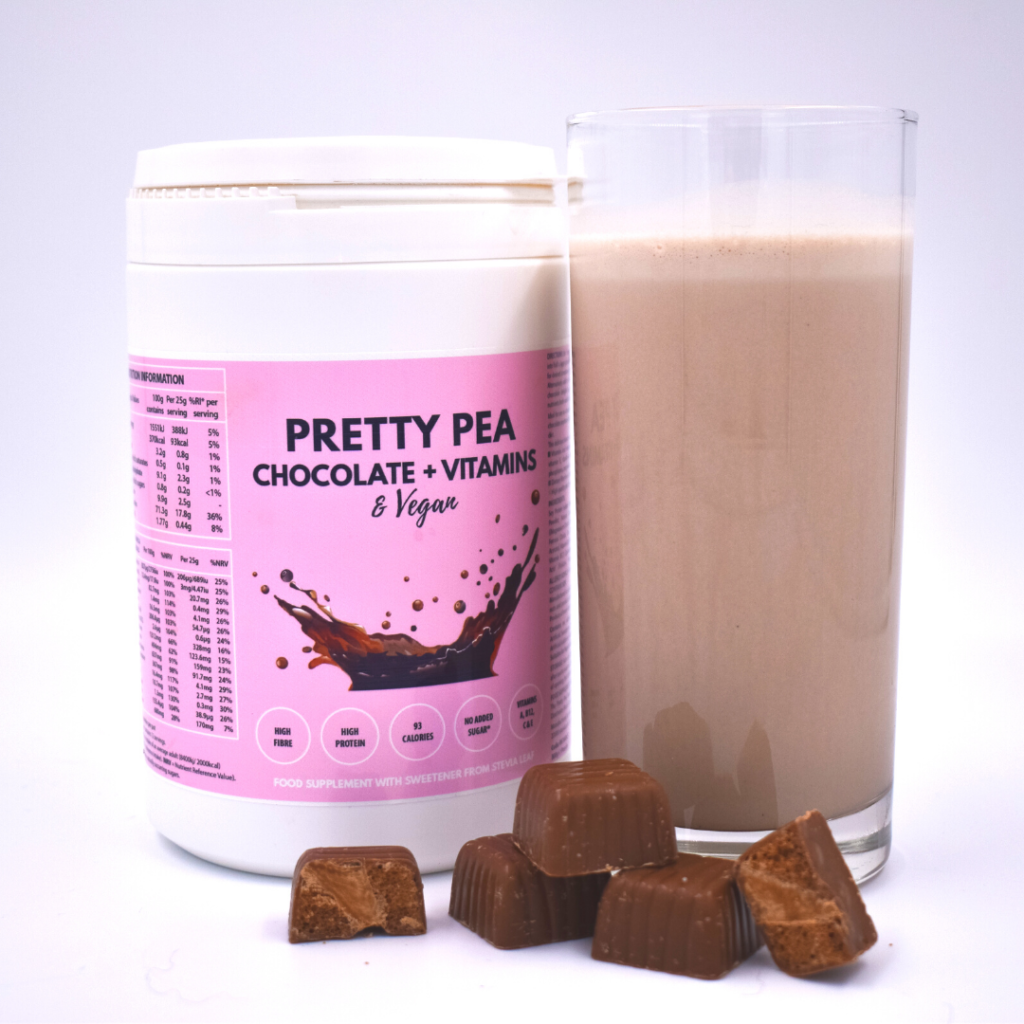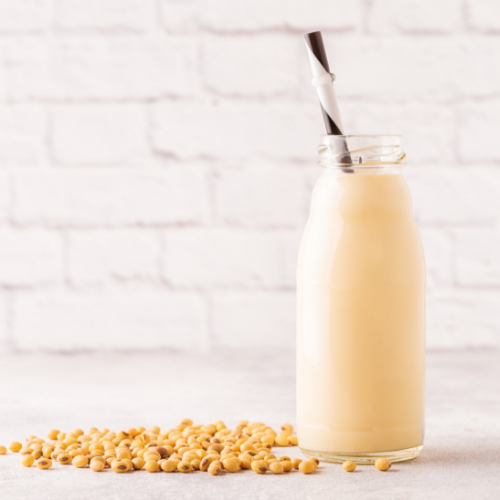| There are so many different options when it comes to protein powders. This article explains soy protein benefits and why it’s so popular with women. Why We Need Protein Proteins are the building blocks of life, found at microscopic levels in our cells, organs & skin. There are 10’s of thousands of proteins each performing different roles quite literally everywhere in our body. Proteins serve as the major structural component of muscle and other tissues in the body. We often typically associate protein with building muscle – yes, protein is essential for building muscle and keeping our body shape with curves in the right places and keeping our body firm. But proteins are so much more than muscle food. Proteins are formed by amino acids – and not all plant protein powders contain all of the essential amino acid (EAA) needed by the body. Different Types of Proteins Collagen and Elastin are both proteins that gives our skin stiffness & rigidity and provide the framework of structures such as our skin. As we age these proteins decline in both quality and quantity which is why the skin starts to sag, become thinner & lose firmness and wrinkles start to form. Another protein is keratin – vital for our hair volume and strength. Some proteins are also used to produce hormones, enzymes and hemoglobin. As a last resort, when carbs and fats aren’t available, proteins can also be used as energy. However, they are not the primary choice as an energy source. Protein has too many other vital functions – it’s just way too busy. Your body prefers to use carbs for energy. Amino Acids For proteins to be used by the body they need to be metabolized into their simplest form, amino acids and it’s a protein amino acid profile and digestibility that accounts for the quality of a protein. There have been 20 amino acids identified that are needed for human growth and metabolism. Twelve of these amino acids (11 in children) are termed non-essential, meaning they can be synthesized by our body and do not need to be consumed in the diet. The remaining amino acids cannot be synthesized in the body making it essential they are consumed via our diet. Essential Amino Acids to be obtained via the diet are: Leucine Isoleucine Lysine Histidine Threonine Tryptophan Valine Phenylalanine Methionine (Arginine) The absence of any of these amino acids will affect our body’s ability for tissue to grow, be repaired and be maintained. Not all plant protein powders contain every essential amino acid (EAA). But two plant proteins that do contain all essential amino acids and classed as a complete protein are pea protein and soy protein. |

| Why Choose Plant Protein There have been a number of health concerns raised concerning the health risks associated with protein emanating primarily from animal sources which have focused on cardiovascular disease due to the high saturated fat and cholesterol consumption and bone health – from bone resorption due to sulfur-containing amino acids associated with animal protein. |
| Soy Protein Benefits The quality of a protein comes down to it’s amino acid profile and also it’s digestibility and how the protein is best utilized in the body. Vegetable proteins, when combined to provide for all of the essential amino acids, provide an excellent source for protein considering that they will likely result in a reduction in the intake of saturated fat and cholesterol. Popular plant sources include legumes, nuts and soy. Vegetable sources of protein also provide numerous other nutrients such as phytochemicals and fibre – both highly regarded in the diet. |
| Soy Protein Benefits Soy is a complete protein with a high concentration of branched chain amino acids. (BCAA). Soy is the most widely used vegetable protein source. The soybean, from the legume family, was first chronicled in China in the year 2838 B.C. and was considered to be as valuable as wheat, barley, and rice as a nutritional staple. Soy protein is an equivalent to animal protein with a score of 1.0, the highest possible rating (Hasler, 2002). Soy’s quality makes it a very attractive alternative for those seeking non-animal sources of protein in their diet and those who are lactose intolerant. There have been many reported benefits related to soy proteins relating to health and performance – including reducing plasma lipid profiles, increasing LDL-cholesterol oxidation and reducing blood pressure. Soy protein Isolates (as found in Pretty Pea Protein) are the most refined soy protein product containing the greatest concentration of protein, but unlike flour and concentrates, contain no dietary fibre – which is why prebiotic fibre from the Chicory Root have been added to our Pretty Pea Shakes. Chicory is one of the few fibres that can act as a prebiotic – aka food for our gut microbiome (probiotics). Isolates are very digestible and often used in foods such as sports drinks, health beverages and infant formulas. |

| Nutritional Benefits For centuries, soy has been part of a human diet. Soy’s overall health benefits were first identified when studying populations with a high intake of soy. These populations shared lower incidences in certain cancers, decreased cardiac conditions, and improvements in menopausal symptoms and osteoporosis in women (Hasler, 2002). Based upon a multitude of studies examining the health benefits of soy protein the American Heart Association issued a statement recommending soy protein foods in a diet low in saturated fat and cholesterol to promote heart health (Erdman, 2000). The health benefits associated with soy protein are related to the physiologically active components that are part of soy, such as protease inhibitors, phytosterols, saponins, and isoflavones (Potter, 2000). These components also demonstrate lipid-lowering effects, increase LDL-cholesterol oxidation, and have beneficial effects on lowering blood pressure. |
| Soy Protein Benefits for Women Additional studies have investigated soy supplementation on women’s health issues. Plants contain compounds with oestrogen-like action called phytoestrogens. Soy contains daidzin, a potent phytoestrogen and studies demonstrate that Phytoestrogen levels increased in women who consumed soy supplement. It has been hypothesized that considering that isoflavones are considered phytoestrogens (exhibit estrogen- like effects and bind to estrogen receptors) they compete for estrogen receptor sites in breast tissue with endogenous estrogen, potentially reducing the risk for breast cancer risk (Wu et al. 1998). Still, the association between soy intake and breast cancer risk remains inconclusive. However, other studies have demonstrated positive effects of soy protein supplementation on maintaining bone mineral content (Ho et al., 2003) and reducing the severity of menopausal symptoms (Murkies et al., 1995). Isoflavones & Bone Density A systematic review of soy isoflavone supplements on osteoporosis in women found that soy isoflavones significantly increased the bone mineral density by 54%. As we transition through menopause our bones can become much weaker and the risk of osteoporosis increases – something again that usually goes un-noticed until it’s too late. Loss of bone density is the reason older women tend to fall easier and break bones easier. |

| Isoflavones and Menopause Symptoms Studies have found that Phytoestrogens appear to reduce the frequency of hot flushes in menopausal women, without serious side-effects. |
| Studies also support Isoflavones can reduce pain significantly. With more studies which combined Soy and Red Clover isoflavones found that they significantly reduced cognitive symptoms and that Red Clover in itself also significantly relieved hot flashes, mood, pain, and cognitive symptoms. |
| Would you benefit from Soy Isoflavones? If you’d benefit from Soy isoflavones and/or Red Clover, you can find quality non-GMO soy isoflavones in Pretty Pea’s Vitamin+ Protein Shakes contain soy isoflavones. Plus Female Balance supplements contain both Soy Isoflavones and Red Clover (20mg per capsule), amongst other hormone balancing nutrients and traditionally used women’s herbals. Please note if you are already taking estrogen/ HRT then it’s not recommended to supplement with any phytoestrogens as it could affect your dosage which your GP will be monitoring with you. |
References
- PMID: 7616867
- PMID: 10432133
- PMID: 22305793
- PMID: 24951101
- PMID: 25263312


